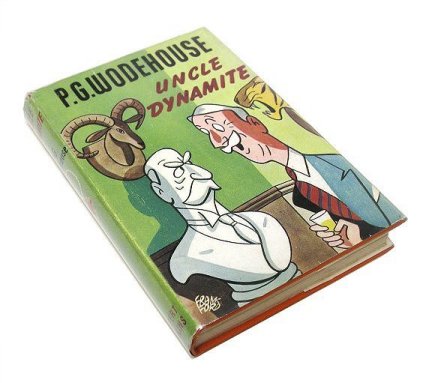|
100 Reasons Your Book Won't Sellby Craig Stark 27 September 2015 |
And Somebody Else's Copy Will
So, maybe not quite 100 reasons it won't sell, but there are so many possibilities that sometimes it feels like it. Speaking of 100, you've probably heard this here at
least 100 times before in one form or another: The quickest way to learn how to sell books is to buy books. I'm going to take my bookseller's hat off today and take you on a
buying trip to show you what I mean from a buyer's point of view.
Now, I collect P.G. Wodehouse. I haven't added much to my collection in recent years, but I have my eyes open for several things that I would buy if the right copy came along. Suppose
one of those things was Wodehouse's Uncle Dynamite, the second so-called Uncle Fred novel. I have a copy already (see below) - and a darned nice one - but there's always a possibility that,
if it got damaged or lost, I would need to replace it.
My first stop would likely be Abebooks because it's the best search engine out there, and search parameters can be adjusted to specify exactly what you're looking for - and readily
readjusted if the first attempt falls short. I would probably look elsewhere as well, but today we're taking just one trip.
To be more specific, what I'm looking for is a copy of the First Edition published by Herbert Jenkins on October 28, 1948 in Near Fine or better condition. This is the true first and
was followed by a US edition published on December 3 of the same year. Issue points are simple: Bound in orange cloth with black lettering and "First Printing" stated on the title page verso.
And note that there is no date, so the correct format for designating it is [1948], not 1948. The standard bibliographic citation is McIlvaine A68a, but occasionally one will encounter
Jenkins 67 as well.
I type in the author, the title, the publisher, click the First Edition box and specify order from lowest to highest price. Note that I did not specify the date because, since there isn't
one stated in the book, I'm guessing that there are First Editions listed with no indication of date. I want a dust jacket as well but know from experience that sometimes copies with
dust jackets won't show up in a search for them (and vice versa), and I don't want to miss any possibilities.
Fifty-seven copies come up priced from $6.00 to $1,000. (Had I specified the date, only thirty copies would have come up.)
Let's talk about dates first. Fully 20 of the copies had descriptions absent any date whatsoever. Two had the wrong date - namely, 1929 and 1947 - and two stated a different but correct
1964 reprint date. Since the book itself is undated, is this important? Yes. What it suggests to me is that these sellers couldn't be bothered with doing the minimal research that would have
been necessary to establish the date - and, the question that comes up in my mind is, What else have they blown off in the description? Needless today, given the large number of available
copies, I'm not a buyer for these.
But I'm not done with dates. The standard practice for formatting a date in a undated book, if the date is known from internal evidence or a bibliographic source, is to place it in brackets
thus: [1948]. How many sellers would you guess did this? A whopping seven. Two others placed the date in parenthesis, and one seller stated "no date but 1948" without brackets and referenced a
catalog that had been consulted. Does this seller get credit? Maybe.
Now, here's the eye-opener. All seven bracketed dates appeared in listings 37-57 - that is, the highest priced copies - and four of these appeared in the five highest priced copies. If you
buy books online much, this is a recurring theme and an important lesson. Time and time again descriptions get better - more professional - as the price increases. What does this tell you about
trusting your seller?
Next, let's talk about establishing edition state. Most sellers stated "First Edition" or "First Printing," but again, only seven described their copies as stated First Editions, and only one
mentioned that this statement appeared on the copyright page. Two other sellers who didn't mention this noted the McIlvaine A68a citation. All nine of these sellers - you guessed it - had higher-priced
copies. Omit relevant issue points at your peril.
A few sellers mentioned "orange cloth," fewer yet "black lettering," a few stated the size, a few the page count - and nobody at all mentioned that their copy had been collated or examined
for completeness. Again, when these omissions occur in sellers' descriptions, the question arises, What else has been omitted?
How about dust jackets? Seventeen sellers made no mention of one. Not surprisingly, these copies were clustered at the bottom of the pricing array. I suppose that some of these copies might
sell but certainly not to somebody looking for a copy in a dust jacket. Too bad if one or more of them possess one. I'm certainly not going to make 17 inquiries to find out. Twenty-two sellers
took the trouble to state no dust jacket. And the remaining 18 copies had described dust jackets.
To be clear: I'm not suggesting that errors in formatting, omissions or other trust issues are necessarily a matter of right or wrong, or that one of these issues on its own is necessarily a
deal breaker, but, as a collector (in the absence of knowing who the seller is), I evaluate each description on the basis of how many issues do appear, and if there are several, I'm almost always
repelled and will not buy the book - and, even if I wasn't looking for a copy in a dust jacket, the majority of the copies I evaluated in my search for Uncle Dynamite today I wouldn't pull the
trigger on. This isn't meant to be a condemnation of the bookselling trade as it is today - frankly, I'm not interested in bad-mouthing it - but, if your sales are languishing, it couldn't
hurt to look at your descriptions from a collector's point of view and ask yourself, Am I building trust into them?
Finally, lest you think that the highest priced copies were overpriced by sellers who didn't know better, noted bookseller Peter Harrington's copy is priced at $586.62, far higher than other
copies that, based on their descriptions, appeared to be in better condition than his. He priced his higher because he can. Guess why.
< to previous article
to previous feature article >

Questions or comments?
Contact the editor, Craig Stark
editor@bookthink.com
















